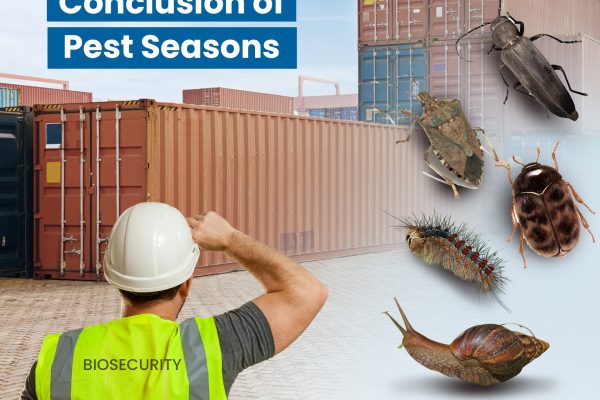Part of the formalities of completing a customs clearance in Australia includes processing your cargo through Biosecurity (or Quarantine). The authority controlling this is called the Department of Agriculture Fisheries and Forestry, or DAFF.
Although your broker will conduct biosecurity formalities simultaneously with the customs clearance, DAFF is a government department operating separately from Customs (ABF) and has its own requirements that apply to documentation, inspections and follow-up actions.
When it comes to inspection and treatment, much of DAFF’s work revolves around live insects and grubs known as ‘hitchhiker pests’ that hide inside shipping containers and cargo. Some of these are seasonal, and two of the major threats that are subject to seasons are about to reach the end of their current cycle.
We expect DAFF to announce the conclusion of the Burnt Pine Longicorn (BPL) flight season in the third week of April. This will be followed at the end of April by the conclusion of the Stink Bug (BMSB) season. The Asian Gypsy Moth (FSCM) remains subject to alert until its season finishes later in May.
Brown Marmorated Stink Bug (BMSB)
The bug, known officially as Brown Marmorated Stink Bug (BMSB) feeds on, and can severely damage, fruit and vegetable crops, rendering them unsellable. Stink bugs can also be a nuisance, entering vehicles, homes and factories for shelter over winter.
BMSB seasonal measures apply to targeted goods manufactured in, or shipped from, target risk countries, that have been shipped between 01 September and 30 April (inclusive), This coincides with autumn and winter in the Northern Hemisphere.
Burnt Pine Longicorn (BPL)
The 2024-25 flight season of the Burnt Pine Longicorn (BPL) began on Friday 01 November 2024 and is expected to end at midnight on Wednesday 30 April 2025.
The BPL beetle often enters Australia on vessels and cargo, including imported timber and machinery from New Zealand. Adult beetles seek shelter in dark secluded areas during daylight and in imported containers and packaging.
AGM Asian Gypsy Moth (FSMC)
The Flighted Spongy Moth Complex – (Lymantria dispar asiatica) – now known as Spongy Moth but formerly known as Asian Gypsy moth and still called AGM – is native to China and Far–East Russia and is commonly found in Korea and Japan.
The AGM is likely to enter Australia on vessels and cargo where they commonly settle on vessel hulls and rigging, shipping containers and vehicles. The current alert season will conclude by the end of May.
Other Hitchhiker Pests
Khapra Beetle
Khapra beetle (Trogoderma granarium) is Australia’s number two National Priority Plant Pest and the number one plant priority pest for grains. Due to its small size, preference for inhabiting crevices and ability to survive for up to 6 years without food, khapra beetle can remain undetected under floors and in cracks and crevices in sea containers.
Containers from target risk countries are treated either using methyl bromide, heat treatment or pesticides and issued with a valid certificate before leaving the port of export.
Giant African Snail
Giant African Snails can live through harsh conditions, weighing up to a kilogram. Adult snails can be found attached to shipping containers, machinery and motor vehicles. Eggs can be carried in soil associated with imported goods.
They are a serious risk to Australia’s horticultural industries; their ferocious appetite is capable of destroying vegetable crops, fruit trees and Australia’s native eucalypt forests.
Biosecurity Requirements
Containers arriving in Australia must be free of any biosecurity risk material. This includes items such as soil, plant materials, pests and animal products.
DAFF’ Cargo Compliance Verification Scheme involves random inspections of cargo. After an inspection, DAFF may direct further treatment to be performed on full containers or individual packages.
Treatments are performed by approved third parties, and may include:
– Heat treatments;
– Steam cleaning;
– Fumigation;
– Seed cleaning; and
– Gamma radiation.
If goods do not meet import requirements, and cannot be treated, they will likely be directed for export or destruction – all at the importer’s expense.
DAFF always reminds importers that it is their responsibility to continue to ensure that any goods imported are free of biosecurity risk material throughout the year, not just during periods of heightened seasonal measures.
For more information about Biosecurity procedures, treatments and charges, contact us here at Colless Young. Talk to Andrew, Tel: +61 7 3890 0800 email enq@collessyoung.com.au.

